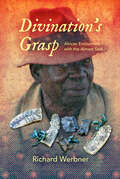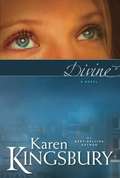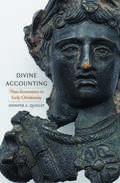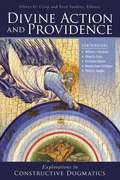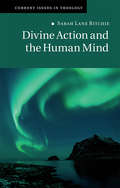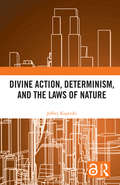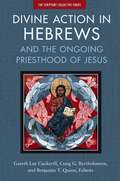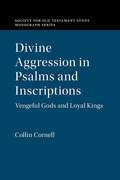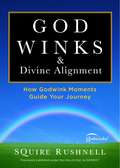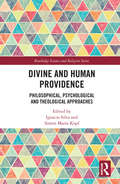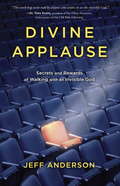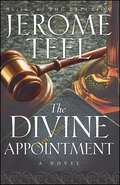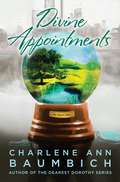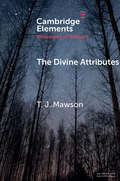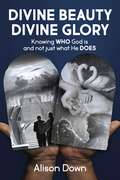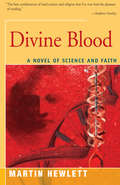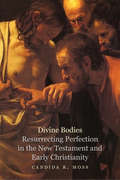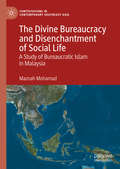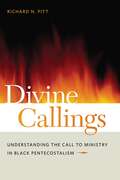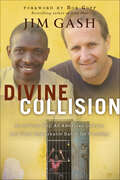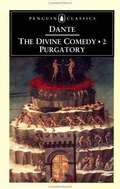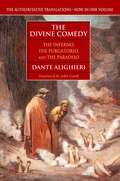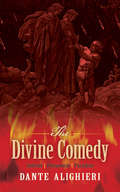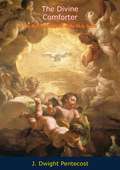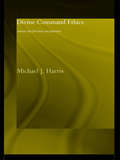- Table View
- List View
Divination's Grasp: African Encounters with the Almost Said
by Richard Werbner“A work of rare depth and profound insight that is destined to become a classic in African Studies and the anthropology of religion.” —Paul Stoller, author of Yaya’s Story: The Quest for Well-Being in the WorldRichard Werbner takes readers on a journey though contemporary charismatic wisdom divination in southern Africa. Beginning with the silent language of the divinatory lots, Werbner deciphers the everyday, metaphorical, and poetic language that is used to reveal their meaning. Through Werbner’s skillful interpretations of the language of divination, a picture of Tswapong moral imagination is revealed. Concerns about dignity and personal illumination, witchcraft, pollution, the anger of dead ancestors, as well as the nature of life, truth, cosmic harmony, being, and becoming emerge in this charged African setting.“Werbner’s Divination’s Grasp documents a long and distinguished career in the service of anthropology. It will be a touchstone for anthropological studies of divination for years to come.” —American Ethnologist“Richard Werbner’s superb account of moral imagination and the poetics of divination grasps the density of its subject, matching the insights of the diviner with those of the ethnographer. The book takes its place among the very best works of Africanist anthropology as a new classic in the tradition of ethnographic divination and a necessary reminder of live and deep traditions of African wisdom.” —Michael Lambek, University of Toronto Scarborough
Divine
by Karen KingsburyMary Madison was a child of unspeakable horrors, a young woman society wanted to forget. Now a divine power has set Mary free to bring life-changing hope and love to battered and abused women living in the shadow of the nation's capital. Mary is educated and redeemed, a powerful voice in Washington D.C. - both to the politically elite and to other women like her. But she also has a past that shamed polite society. Her experiences created in her paralyzing fear, faithlessness, addiction, and promiscuity. At the crossroads of her life, only one power set Mary free and gave her a lifetime of love and hope. A power that could only be divine.
Divine Accounting: Theo-Economics in Early Christianity (Synkrisis)
by Jennifer A QuigleyA nuanced narrative about the intersections of religious and economic life in early Christianity The divine was an active participant in the economic spheres of the ancient Mediterranean world. Evidence demonstrates that gods and goddesses were represented as owning goods, holding accounts, and producing wealth through the mediation of religious and civic officials. This book argues that early Christ-followers also used financial language to articulate and imagine their relationship to the divine. Theo-economics—intertwined theological and economic logics in which divine and human beings regularly transact with one another—permeate the letters of Paul and other texts connected with Pauline communities. Unlike other studies, which treat the ancient economy and religion separately, Divine Accounting takes seriously the overlapping of themes such as poverty, labor, social status, suffering, cosmology, and eschatology in material evidence from the ancient Mediterranean and early Christian texts.
Divine Action and Providence: Explorations in Constructive Dogmatics (Los Angeles Theology Conference Series)
by ZondervanThe claim that God acts in the world is surely a basic theological claim, but it is one that has been construed in a wide variety of ways in the Christian theological tradition. In some accounts, God appears as the largest, first, and most powerful agent. In others, God is portrayed as the transcendent ground of all finite agency, while never acting on the same plane as other agents.The Christian doctrine of providence demands clear and deep thinking about God's relation to the world, about the nature of omnipotence, and about the theological meaning of the course of history. Ideas of miracle, natural law, intervention, and double agency are all closely linked in this fundamental Christian doctrinal complex. The Seventh Annual Los Angeles Theology Conference invited theologians across Christian traditions to engage the doctrine and to contribute their constructive accounts and proposals to the theology of divine action and providence.
Divine Action and the Human Mind (Current Issues in Theology #14)
by Sarah Lane RitchieIs the human mind uniquely nonphysical or even spiritual, such that divine intentions can meet physical realities? As scholars in science and religion have spent decades attempting to identify a 'causal joint' between God and the natural world, human consciousness has been often privileged as just such a locus of divine-human interaction. However, this intuitively dualistic move is both out of step with contemporary science and theologically insufficient. By discarding the God-nature model implied by contemporary noninterventionist divine action theories, one is freed up to explore theological and metaphysical alternatives for understanding divine action in the mind. Sarah Lane Ritchie suggests that a theologically robust theistic naturalism offers a more compelling vision of divine action in the mind. By affirming that to be fully natural is to be involved with God's active presence, one may affirm divine action not only in the human mind, but throughout the natural world.
Divine Action, Determinism, and the Laws of Nature
by Jeffrey KoperskiA longstanding question at the intersection of science, philosophy, and theology is how God might act, or not, when governing the universe. Many believe that determinism would prevent God from acting at all, since to do so would require violating the laws of nature. However, when a robust view of these laws is coupled with the kind of determinism now used in dynamics, a new model of divine action emerges. This book presents a new approach to divine action beyond the current focus on quantum mechanics and esoteric gaps in the causal order. It bases this approach on two general points. First, that there are laws of nature is not merely a metaphor. Second, laws and physical determinism are now understood in mathematically precise ways that have important implications for metaphysics. The explication of these two claims shows not only that nonviolationist divine action is possible, but there is considerably more freedom available for God to act than current models allow. By bringing a philosophical perspective to an issue often dominated by theologians and scientists, this text redresses an imbalance in the discussion around divine action. It will, therefore, be of keen interest to scholars of Philosophy and Religion, the Philosophy of Science, and Theology.
Divine Action in Hebrews: And the Ongoing Priesthood of Jesus (The Scripture Collective Series)
by ZondervanRecent years have seen renewed interest in divine action, but much of the literature tends to focus on the science-theology discussion. Resulting from multi-year work of the Scripture and Doctrine Seminar, part of KLC's Scripture Collective, this book attends to the portrayal of divine action in one major biblical text, namely Hebrews. In the New Testament, Hebrews is on par with Romans in terms of importance but has too often been overlooked. Contributors to this volume explore the many different ways in which divine action is foregrounded and portrayed in Hebrews. As its name indicates, Hebrews overflows with Old Testament intertextuality, which also makes it a fertile ground for analysis of divine action stretching back into the Old Testament and opening out into different parts of the NT. The essays in this volume:rigorously work the interface of theology and exegesis, all related to Hebrews;offer an overview of the current state of discussion of divine action and the importance of exploring divine action in specific biblical texts, with special reference to William Abraham's recent 4 volume work with OUP;provide an overview of the reception history of Hebrews in theologies of divine action;explore how this has this played out in historical theology and what a retrieval of Hebrews for a theology of divine action might mean today;explore the relationship between the doctrine of God and divine action in Hebrews, including an engagement with classical theism;provocatively explore divine action in the OT, creation, and eschatology in Hebrews;explore the major theme in Hebrews of divine action through the ongoing priesthood of Jesus as portrayed in Hebrews;relate this all to preaching Hebrews today and to spiritual formation.The book's conclusion reflects on the primary action of God speaking in Hebrews.
Divine Aggression in Psalms and Inscriptions: Vengeful Gods and Loyal Kings (Society for Old Testament Study Monographs)
by Collin CornellThe aggression of the biblical God named Yhwh is notorious. Students of theology, the Bible, and the Ancient Near East know that the Hebrew Bible describes Yhwh acting destructively against his client country, Israel, and against its kings. But is Yhwh uniquely vengeful, or was he just one among other, similarly ferocious patron gods? To answer this question, Collin Cornell compares royal biblical psalms with memorial inscriptions. He finds that the Bible shares deep theological and literary commonalities with comparable texts from Israel's ancient neighbours. The centrepiece of both traditions is the intense mutual loyalty of gods and kings. In the event that the king's monument and legacy comes to harm, gods avenge their individual royal protégé. In the face of political inexpedience, kings honour their individual divine benefactor.
Divine Alignment: How Godwink Moments Guide Your Journey
by Squire RushnellIt's happened to you. You received a phone call out of the blue; or you bumped into someone who led you to a new job, a new relationship, or opportunity that totally changed your life. You probably even said, "Wow, what a coincidence I met so and so." But did you ever stop to ask what caused that person to be right there, at that exact moment, in your path? It was Divine Alignment: the arrangement of coincidences into a pattern of alignment so astonishing they could have come only from a higher source. In this inspiring new work, SQuire Rushnell shows readers how they can navigate life's thorniest hurdles, rediscover the deep meaning and impact of personal prayer, and develop the individual conviction and wherewithal it takes to reach their full potential and fulfill their most ambitious dreams by honoring the book's seven easy-to-follow steps. In his charmingly avuncular and wonderfully optimistic voice, SQuire shares moving stories from his own and others' lives to show the awesome strength inherent in what he calls God's Positioning System, or GPS. All of us, he assures readers, can use our own personal GPS to grow more closely aligned with God to become vastly more effective, successful, and fulfilled in our relationships, careers, and everything we do. *** DIVINE ALIGNMENT offers a comprehensive approach for living our lives in harmony with God--every minute of every day--offering a whole new paradigm for understanding the mysterious connections between people and events, challenges and solutions. GPS STEP 1: Speak with the Navigator GPS STEP 2: Listen to Your Own Inner Compass GPS STEP 3: Mapping Your Destination GPS STEP 4: Unshackle Your Baggage GPS STEP 5: Step Out in Faith and Believe You'll Arrive GPS STEP 6: Read the Signs, Recalculate, and Accelerate GPS STEP 7: Gratefully Arrive with a Full Well Within
Divine and Human Providence: Philosophical, Psychological and Theological Approaches (Routledge Science and Religion Series)
by Ignacio Silva Simon KopfThis volume offers an original perspective on divine providence by examining philosophical, psychological, and theological perspectives on human providence as exhibited in virtuous human behaviours. Divine providence is one of the most pressing issues in analytic theology and philosophy of religion today, especially in view of scientific evidence for a natural world full of indeterminacies and contingencies. Therefore, we need new ways to understand and explain the relations of divine providence and creaturely action. The volume is structured dynamically, going from chapters on human providence to those on divine providence, and back. Drawing on insights from virtue ethics, psychology and cognitive science, the philosophy of providence in the face of contingent events, and the theology of grace, each chapter contributes to an original overall perspective: that human providential action is a resource suited specifically to personal action and hence related to the purported providential action of a personal God. By putting forward a fresh take on divine providence, this book enters new territory on an age-old issue. It will therefore be of great interest to scholars of theology and philosophy.
Divine Applause
by Jeff AndersonHow will God make himself known to you?How do we have a relationship with a God we can't see? There must be more to the Christian life than silence, and more to God than a vacant stare. Divine Applause weaves together biblical insights and personal stories that illustrate the surprising ways God connects with us. Let Jeff Anderson show you how to use your spiritual senses to experience God. · Sense God's personal attention in unmistakable ways. · Cultivate a constant awareness of God's presence. · Enjoy the reward of secrets between you and God. · Take risks to break out of a status-quo life and connect more directly with God. · Discover the intensity of God's interest in you. You don't have to settle for a distant walk with God. He wants you to know that He notices--and that He delights in you. From the Trade Paperback edition.e. Learn to hear him speak that truth to you.
The Divine Appointment
by Jerome Teel"They aren't hiding just one something, but a bunch of somethings..." Jessica Caldwell hates the day she met him, and she hates him even more. But now the two of them will be connected forever... Eli Faulkner is one of the best trial lawyers in Tennessee. It's what he lives for -- righting injustices. When he's called upon to defend Tag Grissom, an arrogant cardiologist accused of murder, he fi nds himself wondering, could this be more than just a case? Holland Fletcher has always wanted to be a true investigative journalist, but he's never really stepped up to the plate. That is, until he receives an anonymous tip and is plunged into a dangerous realm of intrigue and murder that involves not only the Supreme Court, but the entire nation.
Divine Appointments: A Novel (A Snowglobe Connections Novel #2)
by Charlene BaumbichWith the big 5-0 fast approaching, Josie Brooks begins to question her structured, picture-perfect (mid)life. Josie Brooks, at the age of 47, thought she was leading an enviable single life. A successful consultant, she calls her own shots, goes where the money is, and never needs to compromise. But her precisely managed world begins to falter during a Chicago contract when an economic downturn, a bleeding heart boss, and the loyalty and kindness between endangered employees ding her coat of armor. Throw in hot flashes, a dose of loneliness, a peculiar longing for intimacy, an unquenchable thirst—not to mention a mysterious snowglobe with a serene landscape, complete with a flowing river and lush greenery that seems to be beckoning her in—and Josie&’s buttoned-up life is on the verge of coming completely undone. Maybe her solitary existence isn&’t as fulfilling as she has convinced herself to believe. It will take a few new friends, a mystical encounter, and an unexpected journey to set Josie on her own path to &“right-sizing&” and making the life changes that really matter. Filled with laugh-out loud moments and a gentle dash of inspiration, Divine Appointments is another heartwarming charmer from a master storyteller.
The Divine Attributes (Elements in the Philosophy of Religion)
by Tim MawsonThe Divine Attributes explores the traditional theistic concept of God as the most perfect being possible, discussing the main divine attributes which flow from this understanding - personhood, transcendence, immanence, omnipresence, omniscience, omnipotence, perfect goodness, unity, simplicity and necessity. It argues that the atemporalist's conception of God is to be preferred over the temporalist's on the grounds of perfect being theology, but that, if it were to be the case that the temporal God existed, rather than the atemporal God, He'd still be 'perfect enough' to count as the God of Theism.
Divine Beauty Divine Glory: Knowing WHO God is and not just what He DOES
by Alison M. Downs“The Beauty and the Glory of the Divine” by Alison M. Down is an astute look at the Exodus story that focuses on one Figure that too often remains hidden behind a monumental figure of Moses, and manifold events of the book–on God, the Leader of the Exodus. As we live in an efficiency driven society, we tend to look at actions and results as the highest priority. While the book of Exodus is indeed packed with actions, and as it results in a radical change in history, many Christians tend to overlook the main purpose of the book of Exodus. The main purpose of this, and of every other book of the Holy Scripture, and of the Word Incarnate is to reveal God the Father. Alison in her dynamic study has grabbed the very nerve of the Exodus narrative: the revelation of the Divine Holiness and other attributes and characteristics of God to sinful humankind.As this emphasis is lost–and, unfortunately, it’s been lost in too many publications–the main purpose of the book of Exodus remains only as a potential. On the other hand, Alison helps a reader to refocus from a traditional study of peoples and events of Exodus, to the God of Exodus. The study is carefully organized after the events of the Exodus, yet with each chapter, with each page we come closer not just to the Promised Land, but we come to better understand God-the true Leader of the Exodus.As a systematic theologian I see that this book is needed for two main reasons. First, it provides a unique focus of God. Second, “The Beauty and the Glory of the Divine” by Alison M. Down helps Christians to bridge what seems to be a gap between the God of the Old Testament and His Son Jesus Christ. This study is fun to read, as a reader would certainly share in Alison’s excitement over many personal discoveries. The book is also valuable as it provides numerous parallel stories and texts from other books of the Bible. That solidifies this research and makes reading more diverse and interesting. “I would certainly recommend this material to any diligent student of the book of Exodus.” --Dr. Oleg Zhigankov, PhD, Systematic and Historical Biblical Studies; Pastor North Bay and South River Churches, Ontario Conference of Seventh Day Adventists
Divine Blood: A Novel of Science and Faith
by Martinez HewlettIt is an astonishing discovery: a bloodstained burial shroud entombed in the crumbling walls of a historic French Monastery. Carbon dating concludes the fabric is from the time of Christ. A molecular biologist conducts a daring experiment: the cloning of genetic material recovered from the cloth. Now two men--Father Laurent Carriere and scientist Josh Francis--are plunged into the center of a worldwide religious and political power struggle. But even as Washington and the Vatican vie for control of the relic, members of a secret society take steps to reclaim the holy artifact they have sworn to protect--by any means necessary. Selected by the Literary Guild® and the Doubleday Book Club®.
Divine Bodies: Resurrecting Perfection in the New Testament and Early Christianity
by Candida R. MossA path‑breaking scholar’s insightful reexamination of the resurrection of the body and the construction of the self When people talk about the resurrection they often assume that the bodies in the afterlife will be perfect. But which version of our bodies gets resurrected—young or old, healthy or sick, real-to-life or idealized? What bodily qualities must be recast in heaven for a body to qualify as both ours and heavenly? The resurrection is one of the foundational statements of Christian theology, but when it comes to the New Testament only a handful of passages helps us answer the question “What will those bodies be like?” More problematically, the selection and interpretation of these texts are grounded in assumptions about the kinds of earthly bodies that are most desirable. Drawing upon previously unexplored evidence in ancient medicine, philosophy, and culture, this illuminating book both revisits central texts—such as the resurrection of Jesus—and mines virtually ignored passages in the Gospels to show how the resurrection of the body addresses larger questions about identity and the self.
The Divine Bureaucracy and Disenchantment of Social Life: A Study of Bureaucratic Islam in Malaysia (Contestations in Contemporary Southeast Asia)
by Maznah MohamadThis book traces the expansion of Islamisation within a modern and plural state such as Malaysia. It elaborates on how elements of theology, sacred space, resources, and their interactivity with secular instruments such as legislative, electoral, and new social technological platforms are all instrumentally employed to consolidate a divine bureaucracy. The book makes the point that religious social movements and political parties are only few of the important agents of Islamisation in society. The other is the modern and secular state structure itself. Weber’s legal rational bureaucracy or Hegel’s ethical bureaucracy predominantly characterises a modern feature of governmentality. In this instance an Islamic bureaucracy is advantageously situated not only within an ambit of modernity and therefore legality, but divinity and therefore sacrality as well. This positioning gives religious state agents more salience than any other form of bureaucracy leading to their unquestioned authority in the current contexts of societies with Muslim majority rule. One of the requisites of this condition is the homogenisation of Islam followed by ring-fencing of its constituents. The latter can involve contestations with women, other genders, ‘secular’ Muslims, non-Muslims as well as dissenting Muslims with their differing truthful ‘Islams’.
Divine Callings: Understanding the Call to Ministry in Black Pentecostalism
by Richard N. PittOne of the unique aspects of the religious profession is the high percentage of those who claim to be “called by God” to do their work. This call is particularly important within African American Christian traditions. Divine Callings offers a rare sociological examination of this markedly understudied phenomenon within black ministry. Richard N. Pitt draws on over 100 in-depth interviews with Black Pentecostal ministers in the Church of God in Christ—both those ordained and licensed and those aspiring—to examine how these men and women experience and pursue “the call.” Viewing divine calling as much as a social process as it is a spiritual one, Pitt delves into the personal stories of these individuals to explore their work as active agents in the process of fulfilling their calling. In some cases, those called cannot find pastoral work due to gender discrimination, lack of clergy positions, and educational deficiencies. Pitt looks specifically at how those who have not obtained clergy positions understand their call, exploring the influences of psychological experience, the congregational acceptance of their call, and their response to the training process. He emphasizes how those called reconceptualize clericalism in terms of who can be called, how that call has to be certified, and what those called are meant to do, offering insight into how social actors adjust to structural constraints.
Divine Collision: An African Boy, An American Lawyer, and Their Remarkable Battle for Freedom
by Jim GashDiscover the compelling true story of a former L. A. lawyer and a Ugandan boy falsely accused of murder -- two courageous friends brought together by God on a mission to reform criminal justice.Jim Gash, former Los Angeles lawyer and current president of Pepperdine University, tells the amazing story of how, after a series of God-orchestrated events, he finds himself in the heart of Africa defending a courageous Ugandan boy languishing in prison and wrongfully accused of two separate murders. Ultimately, their unlikely friendship and unrelenting persistence reforms Uganda's criminal justice system, leaving a lasting impact on hundreds of thousands of lives and revealing a relationship that supersedes circumstance, culture, and the walls we often hide behind.
The Divine Comedy: Purgatory
by Dante AlighieriBeginning with Dante's liberation from Hell, Purgatory relates his ascent, accompanied by Virgil, of the Mount of Purgatory - a mountain of nine levels, formed from rock forced upwards when God threw Satan into depths of the earth. As he travels through the first seven levels, Dante observes the sinners who are waiting for their release into Paradise, and through these encounters he is himself transformed into a stronger and better man. For it is only when he has learned from each of these levels that he can ascend to the gateway to Heaven: the Garden of Eden. The second part of one of the greatest epic poems, Purgatory is an enthralling Christian allegory of sin, redemption and ultimate enlightenment.
The Divine Comedy
by Dante Alighieri John CiardiDante Alighieri's poetic masterpiece, The Divine Comedy, is a moving human drama, an unforgettable visionary journey through the infinite torment of Hell, up the arduous slopes of Purgatory, and on to the glorious realm of Paradise--the sphere of universal harmony and eternal salvation. 10 illustrations
The Divine Comedy: Inferno, Purgatorio, Paradiso
by Dante Alighieri Henry Wadsworth LongfellowThis convenient single-volume edition contains all three parts of Dante's 14th-century poem ― Inferno, Purgatorio, and Paradiso ― in an acclaimed translation by American poet Henry Wadsworth Longfellow. Combining classical and Christian history as well as medieval politics and religion, this trilogy of sublime verse is among Western civilization's most important artistic works and essential reading for students of literature and history. Dante's allegory of the soul's journey to God begins with Inferno, in which the narrator traverses the underworld in the company of the ancient Roman poet Virgil. As they travel through the nine circles of Hell, the poets encounter historical and mythological figures suffering symbolic punishments for their earthly crimes. In Purgatorio, Dante continues on alone through the realm of redemption, where departed souls reflect upon their sins and work toward their moral improvement. The tale culminates in Paradiso, where the divine Beatrice guides Dante in the final stage of his intellectual journey from doubt to faith.
The Divine Comforter: The Person and Work of the Holy Spirit
by J. Pentecost“...he shall give you another Comforter, that he may abide with you forever.”—John 14:16Personal, intimate fellowship between the believer and the Spirit is essential for spiritual growth. God’s purpose in redemption is to bring believers into fellowship with Himself. He has therefore given the believer a mind to know Him, a heart to love Him, and a Person to commune with him—the person of the Holy Spirit.Internationally known author and Bible teacher J. Dwight Pentecost examines the Person and ministry of the Holy Spirit in this thorough yet practical work that seeks to know the Spirit’s work in daily life. “It is my desire,” he writes, “to bring you face-to-face with a Person so that you might enjoy fellowship with Him.”Some of the subjects discussed in the eighteen chapters of this work include the nature of the Spirit, the filling of the Spirit, the baptism of the Spirit, the Spirit and the inspiration of Scripture, the witness of the Spirit to the world, and gifts of the Spirit.
Divine Command Ethics: Jewish and Christian Perspectives (Philosophical Ideas in Debate)
by Michael J. HarrisThe central aim of this book is to attempt to determine the response of the classic texts of Jewish traditions to the famous dilemma posed in Plato's Euthyphro: Does God freely determine morality, or is morality independent of God? The author argues that the picture that emerges from Jewish texts is significantly more complex and nuanced than most of the contemporary Jewish philosophical literature is prepared to concede. While providing an extensive discussion of the perspective of Jewish tradition on divine command ethics, this book develops a position that is distinct from and critical of other views that have recently been advanced in Jewish scholarship. At the same time, the book provides a substantial analysis of some Christian perspectives on divine command ethics. Relevant biblical, rabbinic and later Jewish texts are discussed, as well as some of the relevant views that have been taken in philosophical literature and in Christian and Jewish thought.
